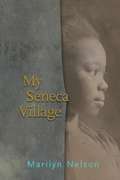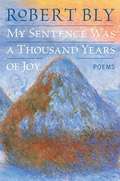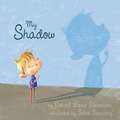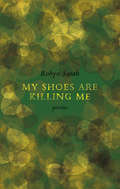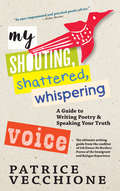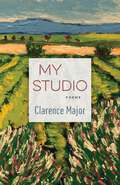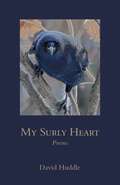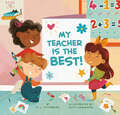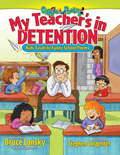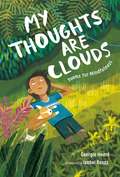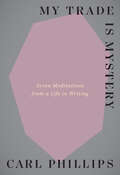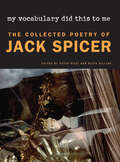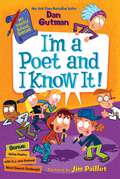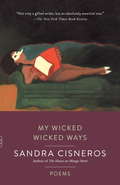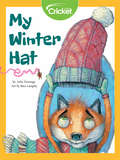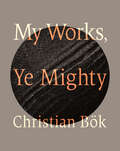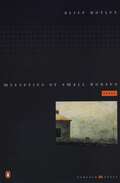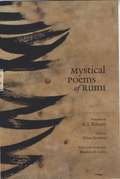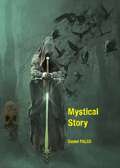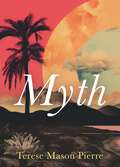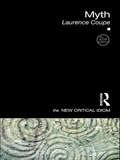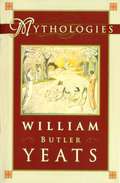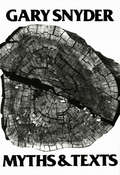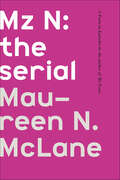- Table View
- List View
My Seneca Village
by Marilyn NelsonThis beautifully crafted and powerful collection of poems deals with a brief period (1825–57) in New York City's storied past. Seneca Village, on Manhattan's Upper West Side, was a thriving multiethnic community of African Americans, Irish and German immigrants, and, possibly, some Native Americans, until it was decimated by the creation of Central Park.<P><P>After poring over the written accounts and census records, renowned poet Nelson sat down to imagine the lives of a number of the residents, giving voice to individuals based on the names and identifying labels. Brief paragraphs set each scene, followed by a poem in the voice of the Seneca Villager. Readers hear from a bootblack, a conjure-man, a reverend, a hairdresser, a nurse, a mariner, schoolchildren, a music teacher, tub-men hauling sewage to the river, an elderly conductor on the Underground Railroad, and abolitionist and activist Maria W. Stewart. As in any impoverished community, the hardships are palpable—babies die of misunderstood diseases, people are victimized by their starving neighbors, there's violence and cruelty—but there is also resilience, hard-won independence, and hope for its children's futures. In the spirit of Edgar Lee Masters's Spoon River Anthology, this work touches on historical truths (footnoted throughout) but introduces a fleeting time and place through the everyday hopes and dreams of its residents. VERDICT This rich and diverse (a variety of poetic forms, including ones invented for certain speakers, are featured) piece of American literature belongs in every collection.
My Sentence Was a Thousand Years of Joy
by Robert BlyA fresh, new volume by one of the premier living American poets Readers have found Robert Bly's ghazals startling and new; they merge wildness with a beautiful formality. The ghazal form is well known in Islamic culture but is only now making its way into the literary culture of the West. Each stanza of three lines amounts to a finished poem. "God crouches at night over a single pistachio. / The vastness of the Wind River Range in Wyoming / Has no more grandeur than the waist of a child." The ghazal's compacted energy is astounding. In a period when much American poetry is retreating into prosaic recordings of daily events, these poems do the opposite. My Sentence Was a Thousand Years of Joy is Robert Bly's second book of ghazals. The poems have become more intricate and personal than they were in The Night Abraham Called to the Stars, and the leaps even more bold. This book includes the already famous poem against the Iraq War "Call and Answer": "Tell me why it is we don't lift our voices these days / And cry over what is happening. Have you noticed / The plans are made for Iraq and the ice cap is melting?" The poems are intimate and yet reach out toward the world: the paintings of Robert Motherwell, the intensity of flamenco singers, the sadness of the gnostics, the delight of high spirits and wit. Robert Bly is writing the best poems of his life, and this book reestablishes his position as one of the greatest poets of our era.
My Shadow (Creative Editions Ser.)
by Robert Louis Stevenson Sara SanchezI have a little shadow that goes in and out with me . . .Inside, outside, climbing up the stairs, or jumping into bed, your shadow may be following you! He may even be one step ahead as you run down the street! Complete with a cast of the whole family, a cat, a dog, and a teddy, this story is for everyone. Little ones who are just discovering their shadows for the first time will find inspiration between these pages, while older, more experienced kids are sure to learn new ways to play with their shadows. Get ready to laugh and giggle and then find the nearest light source and try out some shadows of your own!Sara Sanchez has created soft and inviting illustrations to creatively interpret Robert Louis Stevenson’s original lines from the poem "My Shadow,” which was originally published in his classic for children, A Child’s Garden of Verses. Sanchez’s pictures are filled with humor and help propel this timeless poem into the twenty-first century. My Shadow is sure to become a bedtime favorite for the whole family.Sky Pony Press, with our Good Books, Racehorse and Arcade imprints, is proud to publish a broad range of books for young readers-picture books for small children, chapter books, books for middle grade readers, and novels for young adults. Our list includes bestsellers for children who love to play Minecraft; stories told with LEGO bricks; books that teach lessons about tolerance, patience, and the environment, and much more. While not every title we publish becomes a New York Times bestseller or a national bestseller, we are committed to books on subjects that are sometimes overlooked and to authors whose work might not otherwise find a home.
My Shoes Are Killing Me
by Robyn SarahIn My Shoes are Killing Me, poet Robyn Sarah reflects on the passing of time, the fleetingness of dreams, and the bittersweet pleasure of thinking on the "hazardous . . . treasurehouse" that is the past. <P><P>Natural, musical, meditative, warm, and unexpectedly funny, this is a restorative and moving collection from one of Canada's most well-regarded poets.Robyn Sarah is the author of nine previous collections. Ten of her poems have appeared on The Writer's Almanac, and her work has been anthologized in Garrison Keillor's Good Poems for Hard Times (2005), The Norton Anthology of Poetry (2005), and The Bedford Introduction to Literature (2001).
My Shouting, Shattered, Whispering Voice: A Guide to Writing Poetry and Speaking Your Truth
by Patrice VecchioneThe ultimate writing guide from the editor of Ink Knows No Borders: Poems of the Immigrant and Refugee ExperienceMy Shouting, Shattered Whispering Voice offers ways to express rage, frustration, joy, and sorrow, and to substitute apathy with creativity, usurp fear with daring, counteract anxiety with the joy of writing one word down and then another to express vital, but previously unarticulated, thoughts. Most importantly, here you can discover the value of your own voice and come to believe that what you have to say matters. Especially at this time, when many of us are a tumult of emotions and have time on our hands, picking up pen and paper or getting yourself to a black document might be the best part of your day! By chronicling what you&’re experiencing—the thoughts and feelings—you can calm fear and make art out of what&’s troubling. But don&’t stop there! Find beauty in the silence and celebrate having time to reflect. Written in short, easy-to-digest chapters, My Shouting, Shattered, Whispering Voice includes prompts and inspiration, writing suggestions and instruction, brief interviews with some current popular poets such as Kim Addonizio, Safia Elhillo, and others, and poem excerpts scattered throughout the book.
My Studio: Poems
by Clarence MajorBeginning and ending in Clarence Major’s atelier, My Studio demonstrates how art can influence our perception of the world, prompting “all the parts [to] coalesce into a cohesive whole.” With precise and engaging imagery, Major contemplates the spaces we occupy and the “beauty in everyday things” from the familiarity of his studio. “This is more than a room,” he observes. “It’s an unimpeded mental vista.”Major harnesses both humor and seriousness to investigate a wide range of human experiences. In “A Tragedy Indisputable,” he considers the funeral of a young boy, and the bewilderment and confusion of the crowd, whose “allegiance to logic and reason [is] now in perpetual sway.” In another poem, he paints the picture of a serene day interrupted by “the hammer’s sympathy for the nail, the chatter of ghosts in the bedroom.” In rethinking the relationship between poetry and the world of visual art, Major crafts an intricate and insightful collection, full of passion and inventive language, in which everyday life becomes an opportunity for inward reflection.
My Surly Heart: Poems
by David HuddleIn My Surly Heart, the prolific poet and novelist David Huddle reflects on turning seventy-six years of age and records his aghast reactions to changes brought about by the current president of the United States. Huddle avoids the pitfalls of speechifying, pseudo-philosophizing, or indulging in unmitigated complaint. Instead, he embraces the potential of poetry to use intelligence, wit, language, knowledge, and sense of form to move toward useful revelations. Throughout this idiosyncratic collection of verse, Huddle deploys poem making as a method for psychologically and spiritually navigating from his past to his present life and on into whatever his future may hold. These poems traverse childhood memories, birding adventures, musical reveries, the role of art, and many points in between. My Surly Heart shows a celebrated poet confronting the challenges of age and country with wry humor and unsparing honesty.
My Teacher Is the Best!
by D.J. SteinbergFrom the bestselling author of the hugely popular Kindergarten, Here I Come! comes an ode to that special teacher in every young child's life!Children can celebrate the special teacher in their life with this collection of short poems -- one to a page -- that sings the praises of the excellent educator they know and love. From their kindness working with their students to their ability to make the most complicated of topics make sense, this is the perfect gift book for any teacher, written by the author of the bestselling Here I Come! series, D. J. Steinberg.
My Teacher's In Detention: Kid's Favorite Funny School Poems (Giggle Poetry)
by Bruce Lansky Stephen CarpenterMy Teacher's In Detention contains 50 hilarious poems about school that cover everything from homework and tests to detention and gross-out school lunches. The book contains poems by well-known poets, including Bruce Lansky, Jack Prelutsky, Kenn Nesbitt, and more great "giggle poets." eEditor and contributor Bruce Lansky is one of North America's three bestselling authors of children's poetry books. His kid-tested, giggle-filled children's poetry books have sold over 2.5 million copies. This book follows on the success of Lansky's other school poetry anthologies, No More Homework! No More Tests!, and If Kids Ruled the School, which have sold over 500,000 copies in all editions and are among the best selling children's poetry books at retail.
My Thoughts Are Clouds: Poems for Mindfulness
by Georgia HeardA poetry collection that both illustrates what mindfulness is and encourages young, growing minds to be present, from poet and educator Georgia Heard, with art by Isabel Roxas.Poets have long observed the world in a mindful way. They point out beauty we might have missed, draw our attention to our inner thoughts, and call us to see our society in new ways.But as daily life become more and more chaotic, children grow distracted. According to the CDC, 9.4% of children have ADHD and 7% have anxiety/depression. And these numbers continue to climb. As treatment doctors recommend healthy eating, physical activity, plenty of sleep, and mindfulness techniques.Georgia Heard is a poet and educator—and she has long had her own meditation practice. In My Thoughts Are Clouds, she uses poetry to demonstrate what mindfulness is and gives kids—and their parents and teachers—accessible ways to learn mindfulness tools.
My Trade Is Mystery: Seven Meditations from a Life in Writing
by Carl PhillipsAn invaluable companion for any writer seeking to make the writing life a more complex and cooperative venture &“A lovely, loving letter to aspiring writers.&”—Diego Báez, Booklist In these intimate and eloquent meditations, the award-winning poet Carl Phillips shares lessons he has learned about the writing life, an &“apprenticeship to what can never fully be mastered.&” Drawing on forty years of teaching and mentoring emerging writers, he weaves his experiences as a poet with the necessary survival skills, including ambition, stamina, silence, politics, practice, audience, and community. In the tradition of Anne Lamott&’s Bird by Bird, Rainer Maria Rilke&’s Letters to a Young Poet, and Marcus Aurelius&’s Meditations, this is an invaluable companion for writers at every stage of their journey. Phillips&’s book serves as a partner in speculation and an invitation to embrace mystery.
My Vocabulary Did This to Me: The Collected Poetry of Jack Spicer (Wesleyan Poetry Series)
by Jack Spicer&“An extraordinary collection . . . Like the work of Emily Dickinson and W. B. Yeats, Spicer&’s poems still seem to come from somewhere else.&” —Publishers Weekly (starred review)Winner of the Northern California Independent Booksellers Award for Poetry (2009)Winner of the American Book Award (2009) In 1965, when the poet Jack Spicer died at the age of forty, he left behind a trunkful of papers and manuscripts and a few copies of the seven small books he had seen to press. A West Coast poet, his influence spanned the national literary scene of the 1950s and &’60s, though in many ways Spicer&’s innovative writing ran counter to that of his contemporaries in the New York School and the West Coast Beat movement. Now, more than forty years later, Spicer&’s voice is more compelling, insistent, and timely than ever. During his short but prolific life, Spicer troubled the concepts of translation, voice, and the act of poetic composition itself. My Vocabulary Did This to Me is a landmark publication of this essential poet&’s life work, and includes poems that have become increasingly hard to find and many published here for the first time. &“One of the most important volumes of poetry published in the past 50 years. The poems are simply wonderful, and Spicer&’s mature work is some of the best ever written by an American.&” —Ron Silliman, author of N/O &“You finish My Vocabulary Did This to Me feeling you&’ve come in contact with an original artist and a genuine one . . . You also finish the book thinking that these poems are ready to find a new audience.&” —Dwight Garner, The New York Times
My Weird School Special: I'm a Poet and I Know It! (My Weird School Special)
by Dan GutmanWith more than 35 million books sold, the My Weird School series really gets kids reading! A.J. must figure out how to write the best poem to win a contest in this My Weird School Special from New York Times bestselling author Dan Gutman and veteran illustrator Jim Paillot.To celebrate National Poetry Month, Ella Mentry School will have a schoolwide poem-writing contest, and all the students have to enter. There’s just one problem: A.J. has no time for rhymes!But when an amazing secret prize is revealed, will A.J. be inspired to write a winning poem? And can he beat Little Miss Know-It-All Andrea—the best poet in school?Dan Gutman’s signature kid-friendly sense of humor and Jim Paillot’s fun illustrations are perfectly blended in this weird poetry special you won’t want to miss—featuring bonus poetry writing tips from A.J. and Andrea, games, puzzles, and more!
My Wicked Wicked Ways: Poems (Vintage Contemporaries Ser.)
by Sandra CisnerosHailed as "not only a gifted writer, but an absolutely essential one" (The New York Times Book Review), Sandra Cisneros has firmly established herself as an author of electrifying talent. Here are verses, comic and sad, radiantly pure and plainspoken, that reveal why her stories have been praised for their precision and musicality of language.
My Winter Hat
by Julia DurangoA little fox is about to go outside to play in the snow when his mom reminds him to wear a hat. The little fox explains the many reasons why he doesn't like his hat.
My Works, Ye Mighty
by Christian BökMy Works, Ye Mighty expands upon the conceptual literature of Christian Bök, particularly his ongoing project, entitled The Xenotext. Based upon work conducted during his tenure as the Writer-in-Residence at Athabasca University, this essay addresses the concept of "scale" in poetry, meditating on this topic with an abundance of imagery; moreover, his essay appears, alongside an epic poem, especially written by him for this publication.
Mysteries of Small Houses: Poems (Penguin Poets)
by Alice NotleyA Pulitzer Prize FinalistWinner of the Los Angeles Time Book PrizeAlice Notley vividly reconstructs the mysteries, longings, and emotions of her past in this brilliant collection of poems that charts her growth from young girl to young woman to accomplished artist. In this volume, memories of her childhood in the California desert spring to life through evocative renderings of the American landscape, circa 1950. Likewise, her coming of age as a poet in the turbulent sixties is evoked through the era's angry, creative energy. As she looks backward with the perspective that time and age allows, Notley ably captures the immediacy of youth's passion while offering her own dry-eyed interpretations of the events of a life lived close to the bone. Like the colorful collages she assembles from paper and other found materials, Notley erects structures of image and feeling to house the memories that swirl around her in the present.In their feverish, intelligent renderings of moments both precise and ephemeral, Notley's poems manage to mirror and transcend the times they evoke. Her profound tributes to the stages of her life and to the identities she has assumed—child, youth, lover, poet, wife, mother, friend, and widow—are remarkable for their insight and wisdom, and for the courage of their unblinking gaze.
Mystical Poems of Rumi
by Jalal al-Din Rumi A. J. Arberry Hasan JavadiMy verse resembles the bread of Egypt--night passes over it, and you cannot eat it any more. Devour it the moment it is fresh, before the dust settles upon it. Its place is the warm climate of the heart; in this world it dies of cold. Like a fish it quivered for an instant on dry land, another moment and you see it is cold. Even if you eat it imagining it is fresh, it is necessary to conjure up many images. What you drink is really your own imagination; it is no old tale, my good man. Jalal al-Din Rumi (1207-73), legendary Persian Muslim poet, theologian, and mystic, wrote poems acclaimed through the centuries for their powerful spiritual images and provocative content, which often described Rumi's love for God in romantic or erotic terms. His vast body of work includes more than three thousand lyrics and odes. This volume includes four hundred poems selected by renowned Rumi scholar A. J. Arberry, who provides here one of the most comprehensive and adept English translations of this enigmatic genius Mystical Poems is the definitive resource for anyone seeking an introduction to or an enriched understanding of one of the world's greatest poets. "Rumi is one of the world's greatest lyrical poets in any language--as well as probably the most accessible and approachable representative of Islamic civilization for Western students. "--James W. Morris, Oberlin College
Mystical Story: Mystical Story
by Daniel FalcoMystical Story by Daniel Falco Epic poem about the occult power of dark magic ... Mystical story After Historia Bellica, the epic adventure of the young Bricherasian poet Daniel Falco continues with a second poem, fascinatingly entitled Mystical Story. If in the previous poem it was the brave Aliseo to fight against the Dark Forces and the Destroyers of Worlds that threaten Cosmic Harmony, here it is Milena, daughter of Trade Winds and Maya, to measure herself against the Occult (and Ancient) Power that Humanity wants submissive and slave.
Myth
by Terese Mason PierreMyth, the much-anticipated debut collection from the multi-talented Terese Mason Pierre, weaves between worlds (‘real’ and ‘imaginary’) unearthing the unsettling: our jaded and joyful relationships to land, ancestry, trauma, self, and future. In three movements and two interludes, the poems in Myth move symphonically from tropical islands to barren cities, from lucid dreams to the mysteries of reality, from the sea to the cosmos. A dynamic mix of speculative poetry and ecstatic lyricism, the otherworldly and the sublime, Pierre’s poems never stray too long or too far from the spell of unspoiled nature: “The palm trees nod / at the ocean / the ocean does / what it always does / trusts the moon completely.” Friends ‘with benefits’ tour the wonders of Grenada’s landscapes; extraterrestrials visit the Caribbean and the locals don’t seem phased; red birds “saunter airily like tourists,” La Diablesse lures helpless suitors to their dooms. This collection asks: How can myths manifest themselves in our daily lives? What do we actually mean when we say we love ourselves and others? And how do we pursue/create futures that honour our truths, histories and legacies?
Myth (The New Critical Idiom)
by Laurence CoupeLaurence Coupe offers students a comprehensive overview of the development of myth, showing how mythic themes, structures and symbols persist in literature and entertainment today. This introductory volume: illustrates the relation between myth, culture and literature with discussions of poetry, fiction, film and popular song explores uses made of the term ‘myth’ within the fields of literary criticism, anthropology, cultural studies, feminism, Marxism and psychoanalysis discusses the association between modernism, postmodernism, myth and history familiarizes the reader with themes such as the dying god, the quest for the Grail, the relation between ‘chaos’ and ‘cosmos’, and the vision of the end of time demonstrates the growing importance of the green dimension of myth. Fully updated and revised in this new edition, Myth is both a concise introduction and a useful tool to students first approaching the topic, while also a valuable contribution to the study of myth.
Mythologies
by William Butler YeatsThis enthralling anthology of Irish legends and tales of the occult is composed of three classic collections--"The Celtic Twilight," "The Secret Rose", and "Stories of Red Hanrahan"--and reflects Ireland's greatest poet's deep and abiding interest in preserving and celebrating Irish history and culture.
Myths & Texts
by Gary SnyderGary Snyder's second collection, Myths & Texts, was originally published in 1960 by Totem Press. It is now reissued by New Directions in this completely revised format, with an introduction by the author. The three sequences in the books--"Logging," "Hunting," "Burning"--show the remarkable cohesiveness in Snyder's writings over the years, for we find the poet absorbed, then as now, with Buddhist and Amerindian lore and other interconnections East and West, but above all with the primeval devotion to the land and work. The three sequences in the book--"Logging," "Hunting," "Burning"--show the remarkable cohesiveness in Snyder's writings over the years, for we find the poet absorbed, then as now, with Buddhist and Amerindian lore and other interconnections East and West, but above all with the premedical devotion to the land and work.
Mz N: A Poem-in-episodes
by Maureen N. McLaneThe acclaimed poet, memoirist, and essayist Maureen N. McLane here charts a new path into vital genre-bending territories. Not a novel, not a memoir, not a lyric, Mz N: the serial: A Poem-in-Episodes offers something else—“life . . . a continual allegory” (to invoke Keats): a life intense, episodic, female, sexual, philosophical, romantic, analytic. Tracking the growth of one poet’s mind, switchbacking its way through American English, Mz N toggles between story and song. This is a poetry both “furious / & alive.”Alive to the lash of love, the longueurs of adolescence, the limits of identity, Mz N: the serial: A Poem-in-Episodes is a bravura experiment in life-writing—an assaying, a testing, a transforming, an honoring of the tentative and the torqued. What is it to be contemporary, to be “one / among other ones” in a “cracking world”? How does a body vibrate into being? How is a mind made out of other minds? Seizing the queer realities of any life, Mz N explores how one is surprised, seduced, and struck into speech, thought, song, silence. “Then, what is life?” cried Shelley. So too Mz N.
